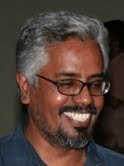ADIEU RAHIM

Adieu Rahim
Valiyakath Abdu or PKA Rahim as he was known among friends and comrades, died at the age of 73 on 1st of October at his home in Trichur. He was bedridden for the last few years and living a life away from the glare of media and the busi-ness of public fora.
A proud citizen of Vanneri, 'the motherland of renaissance' according to him, he was part of various sociopolitical movements from his student days. He was closely associated with Students Federation and the Communist movement in his early days and later influenced by Royist thought, moved on to become a Radical Humanist. He was an ardent follower of MN Roy's thoughts till the end. A rebel by nature, his notions of activism couldn't confine itself to sloganeering and party politics. For him, politics was more potent at the subterranean levels of culture and arts. Being active in various socio-religious and cultural movements that rocked his time, was for him also a process of earning lifelong relationships. He had close, lifelong comradeship with people like M Govindan, MRB, Premji, KCS Panicker, Sachidanandan, KG Sankarapillai etc.
He literally journeyed with the fervour of the intellectual climate of his youth, creating platforms for avant garde expressions. He not only argued and engaged in polemics, he also searched and found ways to create space and voice for rebellion – in politics, arts, life and literature. The publications he brought from his firm - Best Printers - stand testimony to his fascinating affair with modernism and radicalism. His engagement with politics was one that tried to extend the horizons of our political imagination by sparking debates and dialogues. The series of book he planned to publish on Radical HHum
Humanist thought (like N Damodaran's Vyakthi, Samudayam, Viplavam), if it succeeded, would have enriched our political discourses qualitatively into more nuanced explorations about real political alternatives and releasing it from the clutches of Marxist-Antimarxist polemics it fell into.
In the flush of modernism, his radical humanist political little magazine 'Jwala' turned into the most vibrant voice in avant garde literature of the time. Edited by Sachidanandan with an array of brilliant writers behind it, Jwala still remains an unparalleled and unique endeavour of its kind in Malayalam, both with regard to its form and content. In the 70's when spring thunder was in the air and Emergency on land, Rahim was instrumental in bringing out a political avant garde publication Prasakthi. Without Rahim, publications like Kurukshetram and Harishree (a collection of new writings in Malayalam with a polemical manifesto by its editor Sachidanandan), the four books of poems by M Govindan, etc would not have been possible. The innovations these books attempted in layout, design, use of fonts, etc reflect the fervour of the time. In fact he created writers like Maythil Radhakrishnan, one of the most original writers in Malayalam, whose first books, Suryavamsam etc, were published by Best Printers, especially in a time when no established publisher would dream of taking such risks. His last publication was 'Vanneri Nadu', a book edited and brought out by him. It was a rich homage to his homeland - a wonderful collection of history, memoirs, anecdotes, and photographs that sketch the history and cuture of Vanneri.
Rahim leaves a legacy of rebellious living, thought and action. When many of his contemporaries were swallowed by ideologies and waves, got stuck in positions of power and basked in their self-images, he had the courage to travel light and ahead. Pleasant by disposition, he was never one to yearn for glory in isolation or martyrhood, but one who was cheerful and warm with people around, inclusive and dialogic in his engagements, and expressive and constructive in his actions

